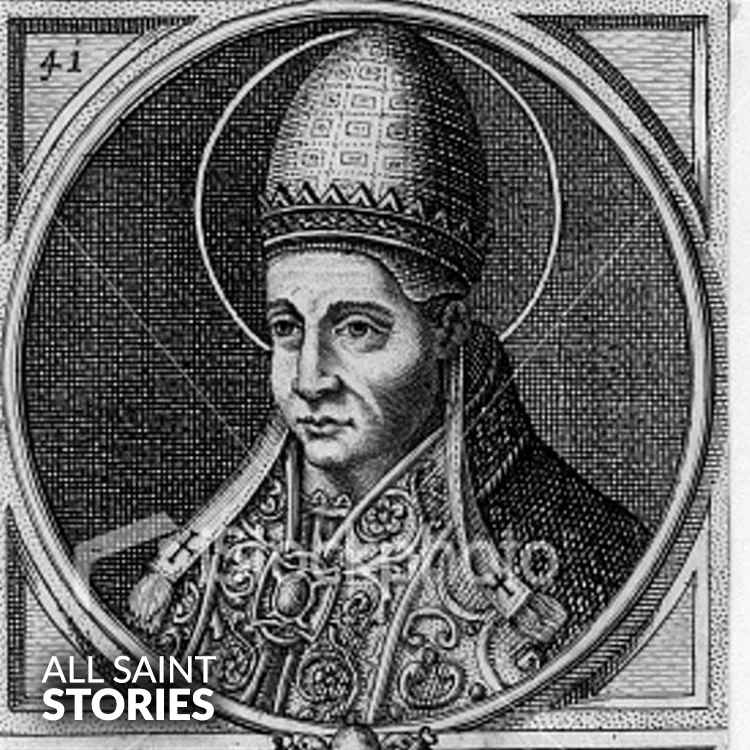Saint Innocent I, you faithfully served the Church as Pope and protector of the faithful. Through your unwavering commitment to Christ and the truth of the Gospel, you defended the faith with courage and wisdom. Intercede for us that we may always remain steadfast in our faith and live in harmony with God’s will. May your example of holiness and leadership inspire us to follow the path of righteousness. Through Christ our Lord, Amen.
ST. INNOCENT I (POPE)
ST. INNOCENT I (POPE)

Pope St. Innocent I served as the Bishop of Rome from 401 to 417 AD. He is known for his strong leadership during a time of crisis, defending Church doctrine, and reinforcing papal authority. His letters guided bishops on theological matters, and he played a crucial role in supporting St. Augustine against heresies like Pelagianism.
Pope Innocent I was born in the mid-4th century in Albano, Italy. He was the son of Pope Anastasius I, making him one of the few popes believed to have been the son of a previous pope. He was elected as the Bishop of Rome in 401 AD, during a turbulent period for both the Church and the Roman Empire.
One of his major contributions was reinforcing the authority of the papacy. Innocent I was instrumental in establishing that doctrinal disputes should be referred to the Pope in Rome, strengthening the role of the Bishop of Rome as the ultimate authority in Church matters. His letters and decrees provided clear guidelines on ecclesiastical discipline and liturgical practices.
During his papacy, Rome was sacked by the Visigoths in 410 AD under King Alaric. Despite the devastation, Innocent I remained steadfast in his leadership, guiding the Church and supporting the city's rebuilding efforts. He also played a crucial role in combatting heresies, particularly Pelagianism, which denied the necessity of divine grace for salvation. His support for St. Augustine in opposing this heresy helped shape Church doctrine.
Pope Innocent I died on March 12, 417, after 16 years of leadership. His legacy as a firm defender of the faith and a key figure in strengthening papal authority remains significant in Church history.
Video Not Found
The information on this website is compiled from various trusted sources. While we aim for accuracy, some details may be incomplete or contain discrepancies.
If you notice any errors or have additional information about this saint, please use the form on the left to share your suggestions. Your input helps us improve and maintain reliable content for everyone.
All submissions are reviewed carefully, and your personal details will remain confidential. Thank you for contributing to the accuracy and value of this resource.
Credits & Acknowledgments
- Anudina Visudhar (Malayalam) – Life of Saints for Everyday
by Msgr. Thomas Moothedan, M.A., D.D. - Saint Companions for Each Day
by A. J. M. Mausolfe & J. K. Mausolfe - US Catholic (Faith in Real Life) – Informational articles
- Wikipedia – General reference content and images
- Anastpaul.com – Saint images and reflections
- Pravachaka Sabdam (Malayalam) – Saint-related content and insights
We sincerely thank these authors and platforms for their valuable contributions. If we have unintentionally missed any attribution, please notify us, and we will make the correction promptly.
If you have any suggestion about ST. INNOCENT I (POPE)
Your suggestion will help improve the information about this saint. Your details will not be disclosed anywhere.
© 2026 Copyright @ www.allsaintstories.com




 English
English
 Italian
Italian
 French
French
 Spanish
Spanish
 Malayalam
Malayalam
 Russian
Russian
 Korean
Korean
 Sinhala
Sinhala
 Japanese
Japanese
 Arabic
Arabic
 Portuguese
Portuguese
 Bantu
Bantu
 Greek
Greek
 German
German
 Dutch
Dutch
 Filipino
Filipino